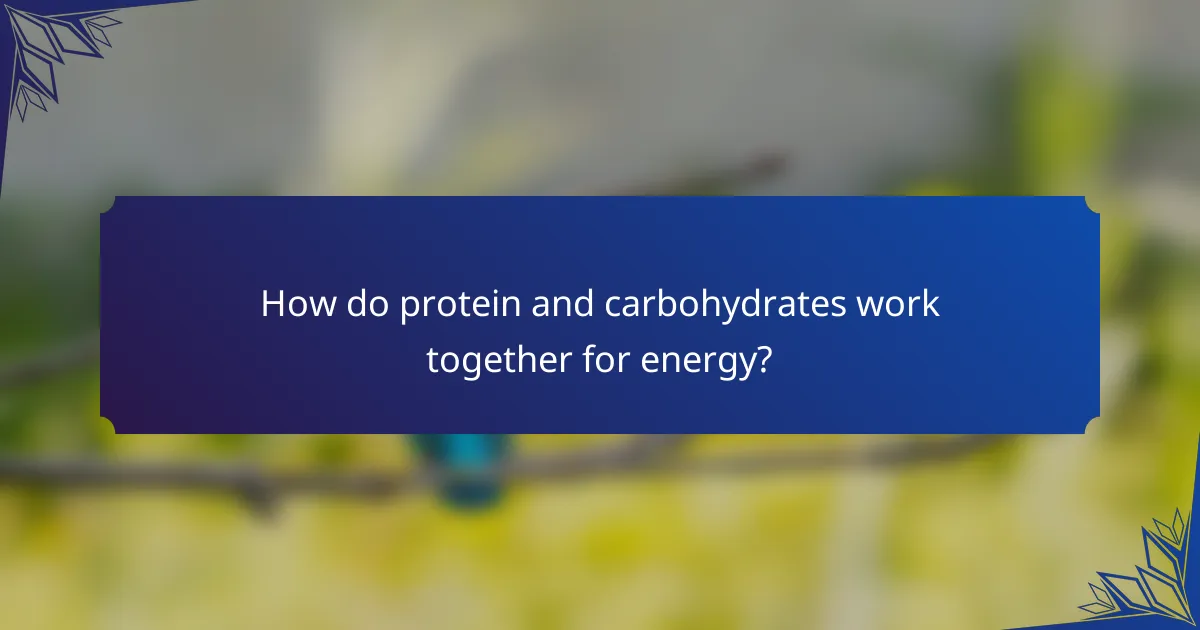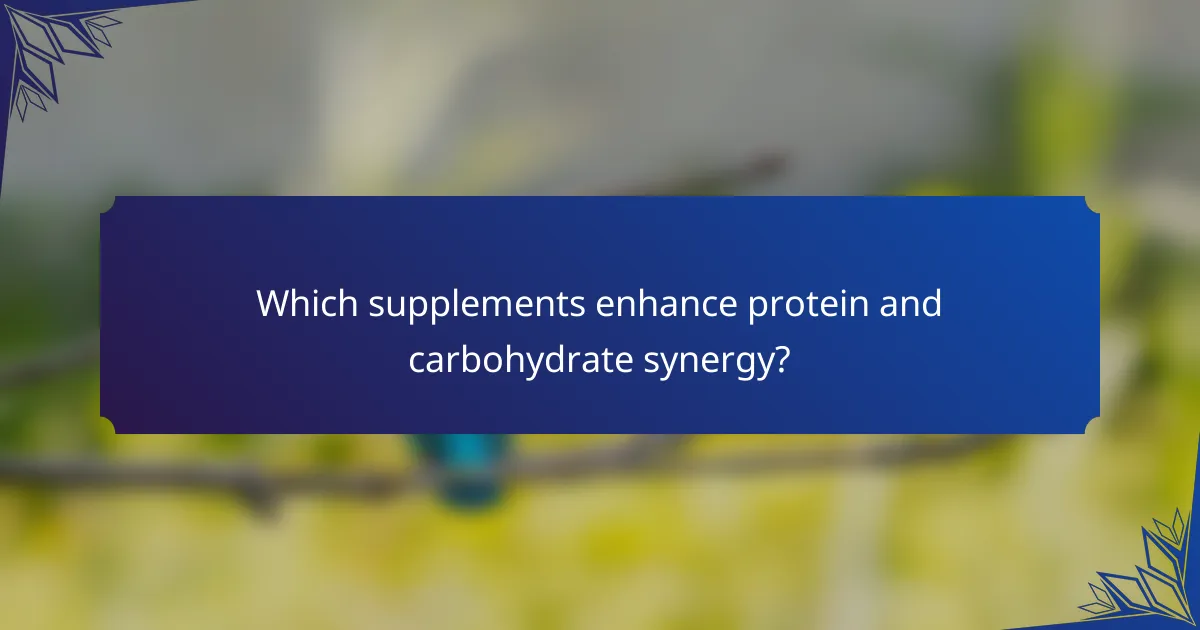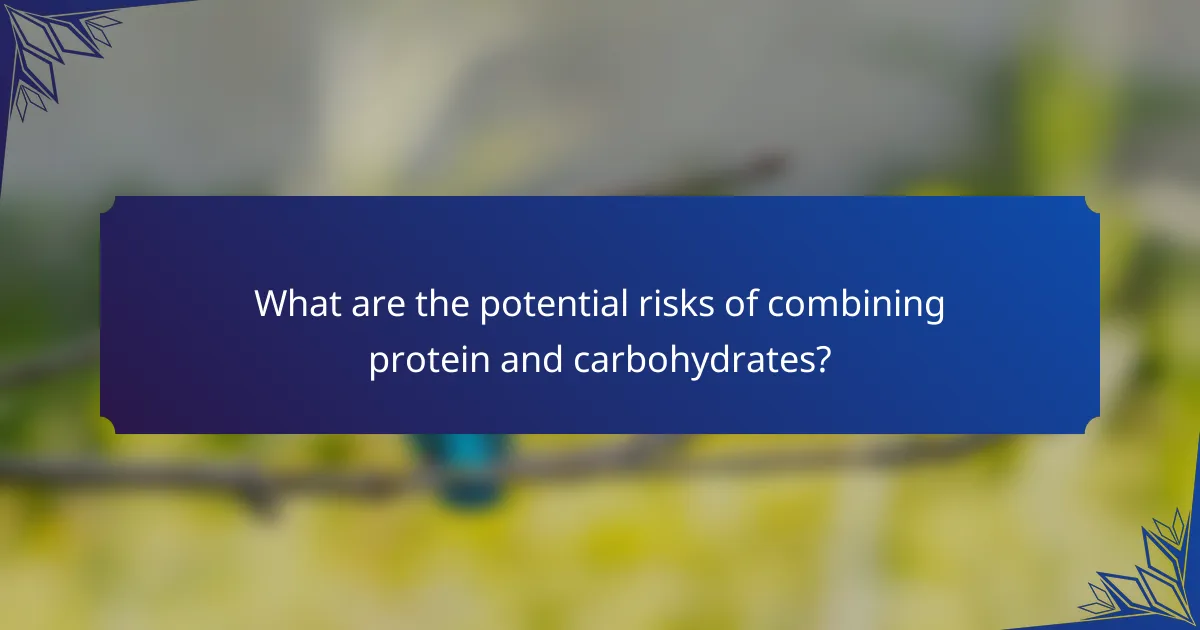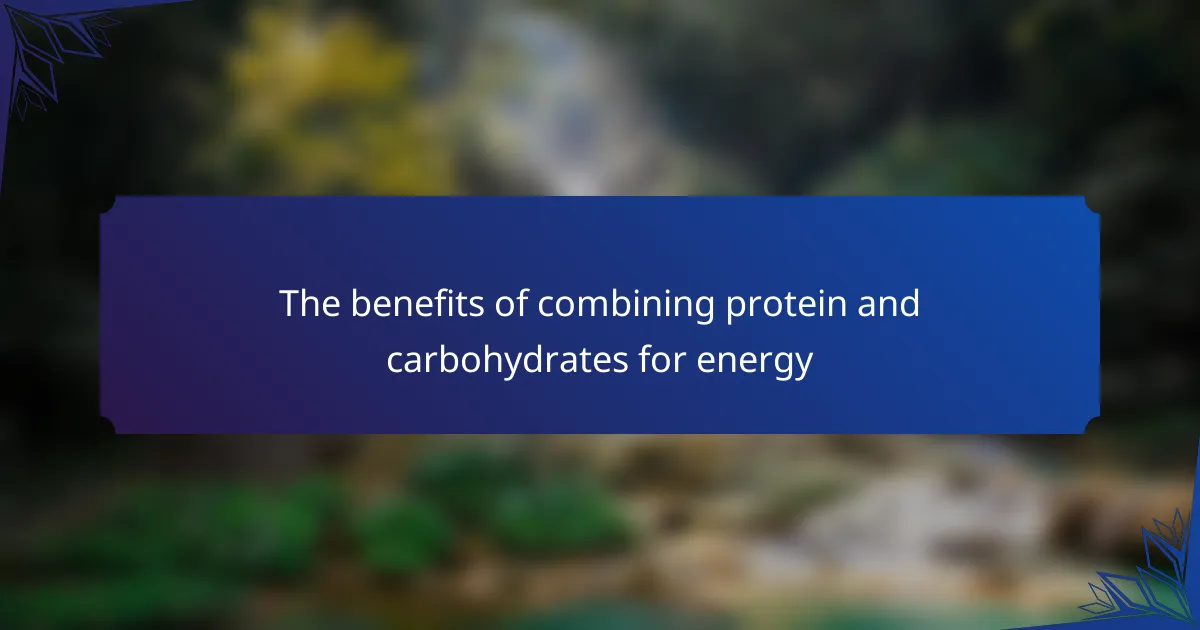Combining protein and carbohydrates is essential for maximizing energy levels and enhancing athletic performance. This powerful duo not only fuels muscle repair but also replenishes glycogen stores, leading to improved recovery and sustained energy during workouts. By strategically incorporating these nutrients, individuals can optimize their performance and support effective weight management.

How do protein and carbohydrates work together for energy?
Protein and carbohydrates work together to provide sustained energy by fueling muscle repair and replenishing glycogen stores. When consumed together, they enhance energy levels, improve recovery, and boost overall athletic performance.
Synergistic effects on energy levels
The combination of protein and carbohydrates can lead to improved energy levels during physical activities. Carbohydrates serve as a quick source of energy, while protein helps maintain muscle mass and supports metabolic processes. This synergy can help athletes and active individuals sustain their energy throughout workouts or competitions.
For optimal energy, consider consuming a meal or snack that includes both macronutrients within 30 minutes after exercising. A ratio of 3:1 carbohydrates to protein is often recommended to maximize glycogen replenishment and muscle repair.
Enhanced muscle recovery
Combining protein and carbohydrates post-exercise significantly aids muscle recovery. Carbohydrates replenish glycogen stores that are depleted during workouts, while protein provides the amino acids necessary for muscle repair and growth. This combination can reduce muscle soreness and speed up recovery time.
A practical approach is to consume a recovery shake or snack that includes both protein and carbohydrates, such as a smoothie with yogurt and fruit, within an hour after exercising. This timing is crucial for maximizing recovery benefits.
Improved endurance performance
For endurance athletes, the combination of protein and carbohydrates can enhance performance by delaying fatigue. Consuming these macronutrients together before or during long-duration activities can help maintain energy levels and improve overall stamina.
A common strategy is to consume a carbohydrate-rich meal with a moderate amount of protein 2-3 hours before an event. During prolonged activities, energy gels or bars that contain both macronutrients can provide a quick source of fuel to keep performance levels high.

What are the benefits of combining protein and carbohydrates?
Combining protein and carbohydrates offers significant benefits for energy, muscle recovery, and overall performance. This combination enhances glycogen storage, optimizes nutrient timing for workouts, and supports effective weight management.
Increased glycogen storage
When protein and carbohydrates are consumed together, they promote greater glycogen storage in muscles. Glycogen is the primary energy source during high-intensity exercise, and adequate storage can improve endurance and performance.
A practical approach is to consume a meal or snack containing both macronutrients within 30 minutes after a workout. This can include options like a protein shake with a banana or Greek yogurt with granola, which help replenish glycogen stores efficiently.
Optimal nutrient timing for workouts
Combining protein and carbohydrates at specific times can enhance workout performance. Consuming this combination before exercise can provide sustained energy, while post-workout intake aids in recovery and muscle repair.
Aiming for a ratio of about 3:1 carbohydrates to protein in your pre- and post-workout meals can be effective. For example, a smoothie with fruit and protein powder or a turkey sandwich on whole grain bread can serve this purpose well.
Support for weight management
Integrating protein with carbohydrates can aid in weight management by promoting satiety and reducing overall calorie intake. Protein helps you feel full longer, while complex carbohydrates provide sustained energy without rapid spikes in blood sugar.
Choosing whole food sources like quinoa with chicken or brown rice with beans can help maintain a balanced diet. These meals not only support energy levels but also contribute to better weight control by curbing cravings and preventing overeating.

Which supplements enhance protein and carbohydrate synergy?
Combining protein and carbohydrates can be optimized with specific supplements that enhance their synergistic effects. Key supplements like whey protein isolate, carbohydrate powders, and branched-chain amino acids (BCAAs) can improve energy levels and recovery when used strategically.
Whey protein isolate
Whey protein isolate is a high-quality protein supplement that is rapidly absorbed by the body. It provides essential amino acids that support muscle repair and growth, making it an ideal choice post-workout when combined with carbohydrates for energy replenishment.
When using whey protein isolate, aim for a serving size of about 20-30 grams mixed with a carbohydrate source, such as a banana or a carbohydrate powder, to maximize recovery and energy restoration.
Carbohydrate powders
Carbohydrate powders, such as maltodextrin or dextrose, provide a quick source of energy that can be easily mixed with protein supplements. These powders help replenish glycogen stores depleted during exercise, enhancing overall performance and recovery.
Consider using carbohydrate powders in a ratio of 3:1 or 4:1 with protein after intense workouts. This balance can optimize energy replenishment and muscle recovery, ensuring you are ready for your next session.
Branched-chain amino acids (BCAAs)
BCAAs, which include leucine, isoleucine, and valine, are crucial for muscle recovery and reducing exercise-induced fatigue. Taking BCAAs alongside carbohydrates can enhance protein synthesis and improve overall energy levels during workouts.
A typical dosage of BCAAs ranges from 5-10 grams before or after exercise. This can be particularly beneficial when combined with a carbohydrate source to further enhance recovery and performance.

What is the best timing for protein and carbohydrate intake?
The optimal timing for protein and carbohydrate intake is crucial for maximizing energy levels and recovery. Consuming these macronutrients at strategic times can enhance performance and support muscle repair.
Pre-workout consumption
For pre-workout consumption, aim to eat a balanced meal containing both protein and carbohydrates about 1-3 hours before exercising. This timing allows your body to digest and convert the nutrients into usable energy, improving endurance and strength during your workout.
Consider a meal that includes complex carbohydrates, such as whole grains or fruits, paired with a source of protein like yogurt or lean meat. This combination can provide sustained energy and help prevent fatigue.
Post-workout recovery
After your workout, it is essential to replenish your energy stores and support muscle recovery by consuming protein and carbohydrates within 30-60 minutes. This window is often referred to as the “anabolic window,” where your body is primed to absorb nutrients effectively.
A good post-workout option could be a protein shake with a banana or a turkey sandwich on whole-grain bread. Aim for a ratio of approximately 3:1 carbohydrates to protein to optimize recovery and muscle synthesis.

How do different sources of protein and carbohydrates compare?
Different sources of protein and carbohydrates vary significantly in their nutritional profiles and effects on energy levels. Understanding these differences can help you make informed choices for optimal energy and performance.
Animal vs. plant protein sources
Animal protein sources, such as meat, fish, and dairy, typically provide all essential amino acids, making them complete proteins. They are often more effective for muscle repair and growth due to their high biological value.
Plant protein sources, including beans, lentils, and nuts, may lack one or more essential amino acids but can still be combined to form complete proteins. They are generally lower in saturated fat and can offer additional health benefits, such as fiber and antioxidants.
Simple vs. complex carbohydrates
Simple carbohydrates, found in foods like sugar and fruit, provide quick energy but can lead to rapid spikes and drops in blood sugar levels. They are best consumed in moderation, especially before or after intense physical activity.
Complex carbohydrates, such as whole grains, vegetables, and legumes, offer sustained energy due to their slower digestion and higher fiber content. Incorporating complex carbs into meals can help maintain stable energy levels throughout the day.

What are the potential risks of combining protein and carbohydrates?
Combining protein and carbohydrates can lead to digestive discomfort for some individuals. While this combination is generally beneficial for energy and muscle recovery, it may cause bloating or gas in those with sensitive digestive systems.
Digestive issues
Some people may experience digestive issues when consuming protein and carbohydrates together. This can include symptoms like bloating, gas, or discomfort, particularly if the meal is high in fiber or fat. Individuals with conditions such as irritable bowel syndrome (IBS) should be cautious and monitor their reactions.
Caloric surplus
Combining protein and carbohydrates can lead to a caloric surplus if portion sizes are not managed. This is particularly relevant for those looking to maintain or lose weight. It’s essential to balance these macronutrients according to your energy needs to avoid unintended weight gain.
Blood sugar spikes
For some individuals, especially those with insulin sensitivity, combining protein and carbohydrates can lead to blood sugar spikes. Choosing low glycemic index carbohydrates can help mitigate this risk. Pairing high-quality protein with complex carbohydrates can provide sustained energy without significant fluctuations in blood sugar levels.
